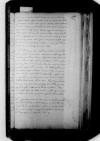List #5762
Alfonso de VALDÉS do Ioannes DANTISCUS[Granada?], [1526-09-18 — 1526-12-16?]
Regest polski: Valdes skarży się żartobliwie Dantyszkowi, że z powodu jego Pasquillusa jest zarzucany listami. Zapowiada, że będzie odsyłał natrętów wprost do niego. Przesyła Dantyszkowi list na temat Pasquillusa, otrzymany od szlachcica hiszpańskiego — krewnego dowódcy piechoty, autora Talichristii [Álvar Gómez de Ciudad Real]. Valdes wyraża opinię, iż Gómez, jak na Hiszpana, jest całkiem nieźle wykształcony i prosi Dantyszka, aby w jego imieniu odpowiedział na list Gómeza. Prosi o pośpiech, ponieważ posłaniec wyrusza już tego wieczora.
Rękopiśmienne podstawy źródłowe:
Pomocnicze podstawy źródłowe:
Publikacje:
| ||||||||||||||||||||
Tekst + aparat krytyczny + komentarzZwykły tekstTekst + komentarzTekst + aparat krytyczny
Salutem plurimam.
Viden, quam mihi tragoediam excitaris cum tuo Pasquillo? Volitavit ille per totam
ms 1 2 autem⌈nuncprint 1 nunc,
ms 1 2 autem⌉ erit pro me patronum agere, quod si praestiteris, et mihi rem
gratissimam facies et te ab invidia liberabis. Sin minus, omnes,
quotquot venerint, ad te remittam. Est
ms 1 2 domini⌈duciprint 1 duci,
ms 1 2 domini⌉ del print 1 infantazgo,
ms 1 2 infantadgo⌈infantazgoprint 1 infantazgo,
ms 1 2 infantadgo⌉
ms 1 2 tuum⌈nuncprint 1 nunc,
ms 1 2 tuum⌉ Pasquillum apud me diversari, hanc, quam vides, epistolam ad me
dedit, quam hac lege ad te mitto, ut meo nomine ad print 1 eam,
ms 1 2 eum⌈eamprint 1 eam,
ms 1 2 eum⌉ respondeas.
Vale.
Postscript:
Vides, quid
Iterum vale.
print 1 Tuus Valdesius,
ms 1 2 omitted⌈Tuus
ms 1 2 omitted⌉
[1] Esteban Gabriel Merino in his cf. Fermin Caballero, Conquenses ilustres, vol. 4: Alonso y Juan de Valdés, Madrid, 1875 , Appendix, No. 23, p. 350⌊letter of Jaen, 1527-11-25cf. Fermin Caballero, Conquenses ilustres, vol. 4: Alonso y Juan de Valdés, Madrid, 1875 , Appendix, No. 23, p. 350⌋, asks Alfonso de Valdés to send him a Pasquillus: Aca me scrivieron que tenia algunas obras de Pasquino. No dexe de nos las embiar porque aca nos sobra el tiempo y qualquier Jenero de nuevas recebimos gran pasatiempo. This is the only mention about Pasquillus in Valdés’ correspondence, if not counting the exchange of letters with Dantiscus. Because not a lot of the correspondence of Valdés has been preserved, it is not possible to establish, if Valdés mentions here that request of Merino or a different one.

 BK 222, No. 47, p. 188
BK 222, No. 47, p. 188